- Home
- Jack Canfield
Christmas Magic Page 3
Christmas Magic Read online
Page 3
With the lack of judgment come sanctuary and an ease in which we confide to each other things which we hesitate to tell even those closest to us. We regale each other with the stories of our most embarrassing moments, we discuss our physical fears and ailments, and we merge into the comfort of camaraderie.
Thanks to a local radio station that gets the season going early, the workshop is filled with the sounds of holiday music, and by the end of the season, the barn is filled to capacity with the smell of pine and crafted greenery to add a touch of Christmas warmth to homes nearby.
Few of us will return next season, but for that brief time, our daily lives take on a slight shift in perspective. Our voices heard, our eccentricities accepted, and an awareness of basic human kindness and commonality of spirit gently fill our souls. It’s a funny thing about Christmas, sometimes the gifts you need most come early.
~Pamela Underhill Altendorf
When Christmas “Fell” on a Thursday
Simplicity is the ultimate sophistication.
~Leonardo da Vinci
No, December 25th is not what the calendar read when my husband and I made a very early Thursday morning trip to our local shopping mall. But it might as well have. For weeks all the light poles and storefronts for blocks around had been adorned with festive Christmas symbols, and the papers were packed with colorful urgent ads.
But Christmas was still more than two weeks away. My birthday came first. “Now please pick out a gift for yourself,” Don urged. “You know I haven’t the slightest idea what to get you.”
“All right, all right,” I agreed. “But straight to the mall, straight home again, okay? We need to get the tree and everything out and start decorating. After all, we’re going to have the grandkids here Christmas Day, and I don’t want them to miss out on a single family tradition.”
Entering the mall by one entrance, we rushed to the nearest store, where I picked up a gift card for myself (to shop with later). Then we rushed right out another entrance. An entrance that had just been hosed down.
Slipping on the wet concrete, down I went. And there I stayed.
“Sorry, dear,” the urgent-care doctor informed me, “but you’ve broken your foot. A classic Jones Fracture. That means you need a splint and some crutches. Keep your broken foot up in the air and don’t put any weight on it.”
Easy for him to say. A splint with open toes in the wintertime? Brrr! But the crutches were even worse. Have you ever tried hopping up steps with crutches, while one foot’s stuck out in front of you? Blam! Face down again, this time smashing both knees. Bye-bye, crutches.
So for my real birthday present that year I got a wheelchair and a visit to another doctor. “Classic Jones Fracture,” he agreed, as he cut off my new splint. “That means you need surgery, not this. I’ll set up an appointment for you this week.”
But when I arrived at the surgical center, I got still another opinion. “Yes,” the surgeon announced, after studying my X-rays, “you do have a classic Jones Fracture. But that means you don’t need surgery; you need an orthopedic boot.”
“Wrong!” I protested. “What I need is to be able to have this whole thing go away so I can be normal again! I still have all my Christmas shopping and decorating and baking and everything to do!”
He smiled, but he still gave me the “boot”—a Darth Vader-like contraption that armor-plated me from knee to toe. At this point, Christmas was now clearly impossible! I mean, even everyday life was almost impossible! The wheelchair wouldn’t fit through half the doors in our home. My husband had to take over all my housekeeping chores—and his eyes began to glaze over with all the new skills he suddenly had to learn.
But it got worse. Suddenly my husband’s glazed eyes took on a new meaning. “Don!” I cried. “You’re burning up with fever!”
After his diagnosis of acute sinusitis and bronchitis, I decided, “All right, God, that’s the last straw. Christmas is now out of the question. It’s history.”
But just before December 25th, Don got better. I got more used to my wheelchair. And we both agreed that, one way or another, we would celebrate Christmas that year!
This meant changes, of course. Instead of decking the entire house “with boughs of holly,” we closed off all rooms except the ones I could move around in with my wheelchair. We put up no decorations except for our Christmas tree. Unable to attach our usual balls and ornaments, I flung red plastic poinsettia blossoms all over it instead. Right from my wheelchair. Guess what? It was beautiful!
More changes: Instead of rising at four to prepare my traditional turkey dinner, I ordered a ready-to-go meal from our local grocery deli. Paper plates replaced my china. Since I couldn’t get back to the mall to shop, most of my presents were online orders or gift cards. And I learned that all the vacuuming, sweeping and scrubbing needed to get ready for the big day could be done from a wheelchair. It took me twice as long, but I got a real kick out of proving I could do it!
I even made it to our traditional Christmas Eve party at a beloved family member’s apartment three flights up (and no elevator). After crawling up on my hands and knees, I was carried back down afterward like a prized trophy by a courageous young man—to everyone’s applause.
But one thing didn’t change: When our children and grandchildren finally poured in the front door on Christmas Day, it was to shouts of joy and hugs and giggles as always. Appetites were just as vigorous for my readymade meal as they had been for my homemade ones. And exclamations of “Oh, this is great!” and “You shouldn’t have—but I’m glad you did” bubbled around the tree just as they always did.
Finally our troops headed home with their new treasures, leaving Don and me surrounded by half-eaten pies, used paper plates, bags of discarded Christmas wrapping—and warm-fuzzy memories.
Yes, Christmas “fell” on a Thursday. But it rose again on a Monday just as the calendar said it should—glorious and glowing and goose-bumpy grand, as always. Straight from our hearts.
~Bonnie Compton Hanson
Christmas Gift From Heaven
There are things that we don’t want to happen but have to accept, things we don’t want to know but have to learn, and people we can’t live without but have to let go... and go on.
~Author Unknown
This past Christmas was going to be a tough one for my family. It would be our first Christmas without our dad, who had lost his battle with cancer. I didn’t even want to think about Christmas—and I sure didn’t want to celebrate. I have been, and always will be, a devout Daddy’s girl. And, so—when my mom called me eight days before Christmas, there was still no Christmas tree, not the first Christmas decoration, nothing. I was trying to forget that Christmastime was here at all.
My mom lives six hours away from us. Since I am the only sibling who works from home, it was my job to drive down and bring her back up for Christmas with the family. She asked if I had decorated the house yet. No. That wasn’t the answer she wanted to hear—she had put up a Christmas tree and she lived alone. I had two kids—what was I doing? Get the tree put up and get ready for Christmas. I am forty-two years old and still afraid of my mom—so, I put that tree up. And, picked up my mom and brought her home for Christmas.
I refused to get in the Christmas spirit, however—not without my daddy! I wouldn’t! Six months before, I had watched my dad take his last breath—and I did not want to be happy. Although I was raised in a Christian home and my dad never wavered in his faith for one minute, I didn’t want any part of it now. I just wanted to be left alone to die a slow death—I didn’t want anyone to speak to me, I didn’t want anyone to hug me or touch me. I couldn’t even hug my own children. I wanted to close the world out and just sit in front of my computer and pretend that I could feel nothing.
I never stopped to think what I was doing to my family—my mom who had lost her best friend of forty-one years, my kids who needed a mother to help them get through the pain of losing a very special granddaddy, my husband who ha
d given up his family for three months so that I could care for my dad, my sisters and brother who had also lost their dad. I couldn’t think about them—all I could think about was the pain that I was feeling—and the fact that I never wanted to feel it again.
My dad had taught me how to be a Christian. He had taught me about the wonderful place that he would be living when he said goodbye to us. The days before he died, he was in his own little world—his mind had already left and he was looking ahead. The night before he began his journey home, he “woke up” from that stupor, raised his head and sang “Peace in the Valley” in that clear, beautiful bass voice that we had all loved since childhood. He wanted us to be happy for him—he was at peace—yet here I was. I couldn’t be happy for him because it hurt too much to be without him.
A couple of days before Christmas, Mom told me that she had a gift for me. She didn’t want me to wait until Christmas Day to open it—she wanted me to have it now. Thinking it would be a book on how to deal with loss, I agreed to open it—another book I could hide in. (Since the age of four, when I learned to read, my gifts have always been books.) So, I sat down beside her to open my book. But, what was this? There was no book in that box! In that box was an ornament for my Christmas tree. Mom told me to read it. I did. There was a poem on the front—“Merry Christmas from Heaven” by John Wm. Mooney, Jr. It was a beautiful poem. And on the back was inscribed, “I Love You, Daddy.”
I walked outside so that my mom wouldn’t see my tears—and I let go, let go of the pain, let go of the tears, I just let go. When I came back inside the house, there, waiting for me was this wonderful woman—who, amidst the greatest pain of her life, thought not of herself, but of healing her children. The most special Christmas gift I will ever receive, given to me with the love that only a mother can feel, began the healing process. And, as only a daddy can, mine reached down and filled my heart once again with love with a Christmas gift from Heaven.
~Cindy Holcomb
The Christmas Lesson
The human spirit is stronger than anything that can happen to it.
~C.C. Scott
“We’ll get you to do Emma’s treatment tonight,” the charge nurse said to me as she was doing her workload assignment. “It’s difficult and takes time, but Emma will put you at ease with it.”
It was Christmas Eve, and I was looking forward to the morning, when my children would see what Santa had brought them. Christmas is a hectic time for young, working mothers, and I was no exception. I was totally fatigued. There had been so many Christmas concerts and parties, and shopping, baking, and all that we do at Christmastime.
During the holidays, to accommodate the vacation schedules of the employees, our hospital reassigned nurses to where the need was greatest. I had already worked a day shift on this particular unit, and had heard about Emma, a frail little eighty-year-old lady who suffered in silence. Advanced carcinoma was gradually destroying Emma’s face, exposing blood vessels and leaving her prone to hemorrhage.
Emma was on a progressive care unit, and many of its patients would be going home the next day, Christmas, to spend time with their families. I read Emma’s chart and realized that going home was not an option for her. She required too much care to be eligible for a nursing home, so she stayed where she was on the unit, the place she now thought of as home.
I went to her room and introduced myself.
“Do you like my tree, dear?” she asked.
Yes, I told her. Though she could barely see it, Emma had a wonderful tree with twinkling lights, and ornaments donated by her nurses. Her tape player quietly played Christmas music, and before I started her treatment, Emma asked me to change the music. I chose a tape, put it in the player, and “Silent Night,” my favorite Christmas carol, started softly playing. I glanced out the window at the glistening snow which was reflecting the Christmas lights that were part of the hospital’s effort to make it feel more like home for those who could not go home for Christmas.
I started to remove the huge bandages that covered Emma’s head and face. I was ill-prepared for how disfigured she was from the carcinoma, how involved her treatment was, and tried hard not to let her see my shock and disbelief. I had never, ever, seen facial deformity so severe. I found myself sweating, and my heart racing.
Emma could barely see, and spoke in a whisper. “You’re not scared, are you dear?” she asked in a whisper. I assured her I was not. Tiny, frail and ill, she endured her treatments without complaint, often reassuring me that she was okay, and not to be upset for her because it wasn’t too painful if her treatment was done gently.
“You’re new though, and very young. Do you have children, dear?” she queried. (To Emma everyone was “dear.”) I told her about my little children and how excited they were about Santa.
Then I felt her hands on my face. Emma said she wanted to know what I looked like, and remarked that I had my hair pulled up under my nurse’s cap. She asked if she could touch my long hair. I stopped the treatment, removed the gloves, took off my cap and let my hair fall loose. She ran her hands through my hair, and told me about the long hair she had as a young woman, how her husband had loved it, how he would tell her how attractive she was and how proud he was of her and their children. She told me about the Christmas traditions they kept, how she loved him, and how she was relieved that, having predeceased her years ago, he did not have to see her like this.
Emma’s care took over an hour, and she talked in her whispering voice as I did her treatment with a lump in my throat, and listened to the soft sounds of the Christmas carols filling the room.
When I was through, Emma asked me to sit for a moment. The night was quiet so I sat beside her as she held my hands. She continued to talk, and give me advice, which overwhelmed me. She told me she thought I was tired, and she remembered being tired when her children were small and Christmas so demanding. From under those heavy bandages, she advised me to never take my health for granted, to be thankful I could see and hear, that I could dance around my house with my baby girl in my arms as I told her I did, that I could drive a car, read a book, laugh and sing, and do all the things that make up a life, things I had never thought about to any degree. She felt my wide wedding band, and expressed how she wished she could see it.
A tear fell from my face unto her hand from the tears I could no longer hold back.
She told me not to cry, that she had accepted her fate, and I should too. Emma made me promise to live life fully while I was able, thanked me for my tenderness with her painful treatment, and wished me a Merry Christmas. The music was still softly playing.
When I left her room that night, I knew that my experience with Emma was exceptional. A weak, elderly woman, clinging to life, understood the angst of a young nurse, wanted to touch my hair, wanted to talk, and to give advice to a young nurse and mother. She made me aware of just how much I took for granted, and reminded me to remember the reason for the season.
Because I was then off for the holidays and after that I returned to work in the operating room, I never saw Emma again. That Christmas Eve with Emma was thirty years ago, but I recall it with amazing clarity. I believe our paths crossed for a reason.
Emma reminded me that I should slow down and treasure all that I had in spite of my busy life. This is especially true at Christmas, when amidst the tumult, frenzied activity and hurried preparations, the true meaning of Christmas is often lost. It was an unforgettable lesson.
~Bonnie Jarvis-Lowe
The Goofy Monkey
Let your tears come. Let them water your soul.
~Eileen Mayhew
The Christmas season has crept up on me again. I’m feeling particularly melancholy this year, the year that marks my thirtieth Christmas without my parents. I agree to shop with a friend, hoping to find some spirit to celebrate the season. We meander through crowded kiosks in a local collectibles shop named Studebaker’s. My mind wanders, taking me back to happier times. I see a red and white enameled kitchen t
able, jadite bowls, a bedroom set just like the one in my mother’s bedroom. I know it is called waterfall because the wood grain runs over the rounded edges of the pieces, like water running over Niagara Falls. Mom had told me that she and Dad honeymooned there. It was the farthest she’d ever traveled in her whole life. The world was so much smaller then....
Thirty years ago, on Christmas Eve, my mother was dying of advanced breast cancer. I was nineteen, trying my best to make it a good Christmas for her. I’d decorated our scrawny, artificial tree with the patchwork of mismatched ornaments we’d hung together every year. I’d baked butter cookies and apple pie, in a feeble attempt to recreate the smells and tastes that might remind us of happier holidays. Dad and my younger brother Billy stayed in the background, for Mom had trained them well. These were her jobs and I was being handed the baton.
That afternoon, I’d noticed shiny, wet tracks that formed as quiet tears rolled down Mom’s cheeks. My first thought was “Oh no, what am I doing wrong?” as if everything somehow centered on me.
“Mom, what’s the matter?” I asked.
“I don’t have anything to give you for Christmas,” she said.
“That doesn’t matter. Don’t worry about me.”
She placed twenty dollars in my hand and said, “Please go to the avenue and buy yourself something. I want you to have a gift under the tree.”
I knew my mother could not be left alone for any length of time. She was terribly weak and had trouble getting up from the chair. She had fallen a few times trying to walk from room to room. I was keeping a vigil and wanted to be there to help her if she needed me.

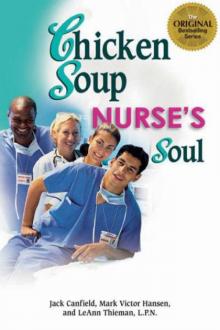 Chicken Soup for the Nurse's Soul: Second Dose
Chicken Soup for the Nurse's Soul: Second Dose Chicken Soup for the Ocean Lover's Soul
Chicken Soup for the Ocean Lover's Soul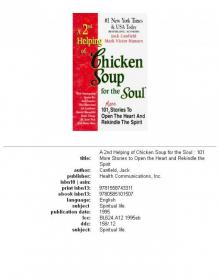 A 2nd Helping of Chicken Soup for the Soul
A 2nd Helping of Chicken Soup for the Soul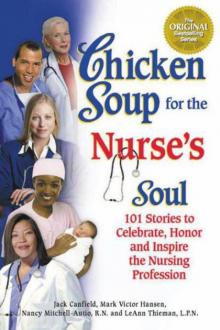 Chicken Soup for the Nurse's Soul
Chicken Soup for the Nurse's Soul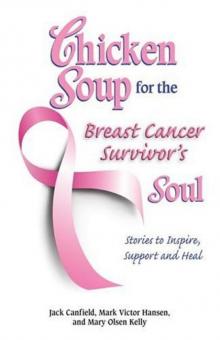 Chicken Soup for the Breast Cancer Survivor's Soul
Chicken Soup for the Breast Cancer Survivor's Soul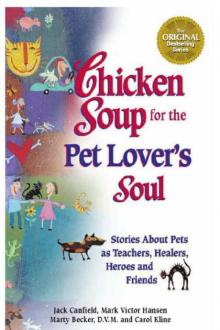 Chicken Soup for the Pet Lover's Soul
Chicken Soup for the Pet Lover's Soul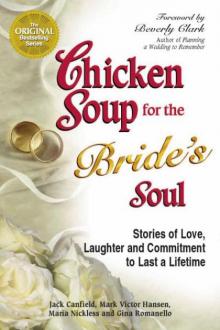 Chicken Soup for the Bride's Soul
Chicken Soup for the Bride's Soul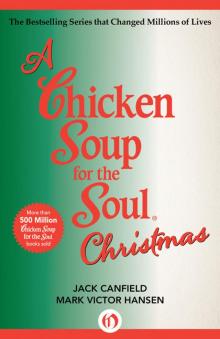 A Chicken Soup for the Soul Christmas
A Chicken Soup for the Soul Christmas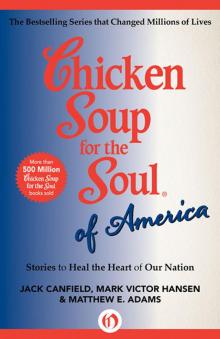 Chicken Soup for the Soul of America
Chicken Soup for the Soul of America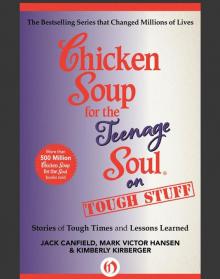 Chicken Soup for the Teenage Soul on Tough Stuff
Chicken Soup for the Teenage Soul on Tough Stuff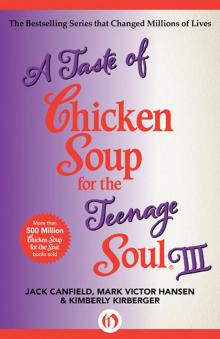 A Taste of Chicken Soup for the Teenage Soul III
A Taste of Chicken Soup for the Teenage Soul III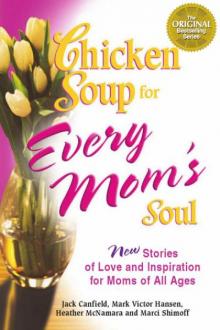 Chicken Soup for Every Mom's Soul
Chicken Soup for Every Mom's Soul Chicken Soup for the Dog Lover's Soul
Chicken Soup for the Dog Lover's Soul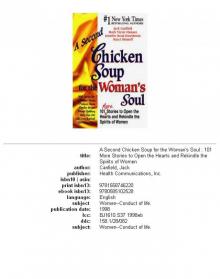 A Second Chicken Soup for the Woman's Soul
A Second Chicken Soup for the Woman's Soul Chicken Soup for the Soul the Book of Christmas Virtues
Chicken Soup for the Soul the Book of Christmas Virtues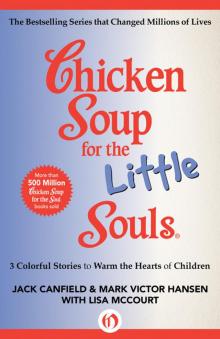 Chicken Soup for the Little Souls: 3 Colorful Stories to Warm the Hearts of Children
Chicken Soup for the Little Souls: 3 Colorful Stories to Warm the Hearts of Children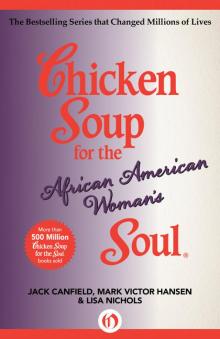 Chicken Soup for the African American Woman's Soul
Chicken Soup for the African American Woman's Soul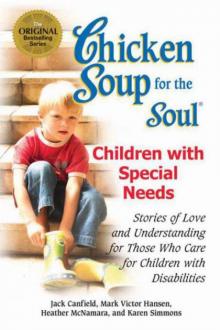 Chicken Soup for the Soul
Chicken Soup for the Soul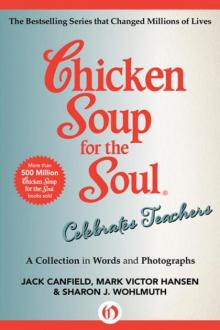 Chicken Soup for the Soul Celebrates Teachers
Chicken Soup for the Soul Celebrates Teachers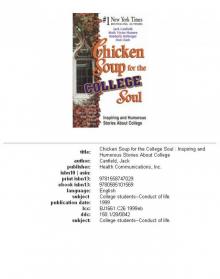 Chicken Soup for the College Soul
Chicken Soup for the College Soul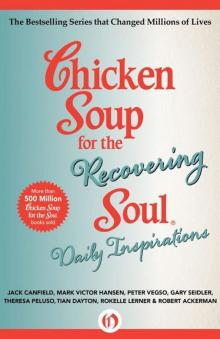 Chicken Soup for the Recovering Soul Daily Inspirations
Chicken Soup for the Recovering Soul Daily Inspirations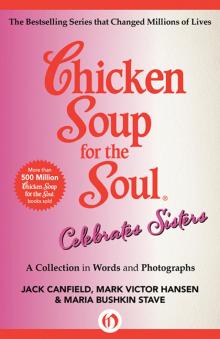 Chicken Soup for the Soul Celebrates Sisters
Chicken Soup for the Soul Celebrates Sisters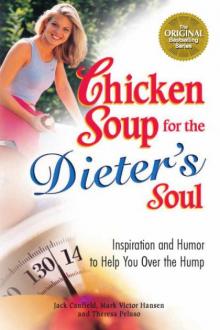 Chicken Soup for the Dieter's Soul
Chicken Soup for the Dieter's Soul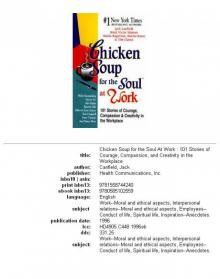 Chicken Soup for the Soul at Work 101 Stories of Courage
Chicken Soup for the Soul at Work 101 Stories of Courage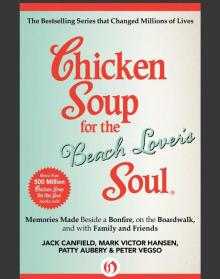 Chicken Soup for the Beach Lover's Soul
Chicken Soup for the Beach Lover's Soul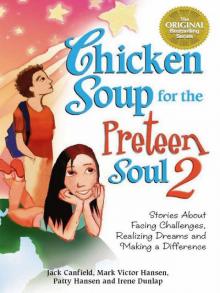 Stories About Facing Challenges, Realizing Dreams and Making a Difference
Stories About Facing Challenges, Realizing Dreams and Making a Difference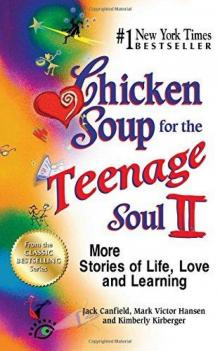 Chicken Soup for the Teenage Soul II
Chicken Soup for the Teenage Soul II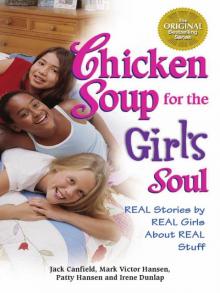 Chicken Soup for the Girl's Soul
Chicken Soup for the Girl's Soul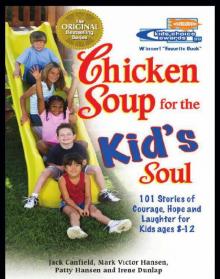 Chicken Soup for the Kid's Soul: 101 Stories of Courage, Hope and Laughter
Chicken Soup for the Kid's Soul: 101 Stories of Courage, Hope and Laughter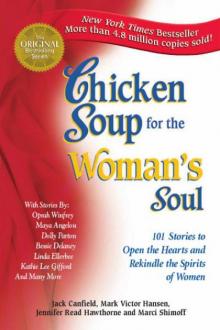 Chicken Soup for the Woman's Soul
Chicken Soup for the Woman's Soul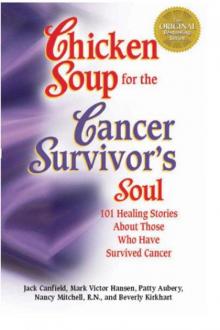 Chicken Soup for the Cancer Survivor's Soul
Chicken Soup for the Cancer Survivor's Soul Chicken Soup for the Canadian Soul
Chicken Soup for the Canadian Soul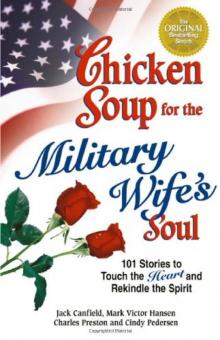 Chicken Soup for the Military Wife's Soul
Chicken Soup for the Military Wife's Soul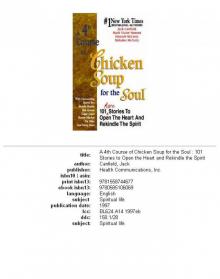 A 4th Course of Chicken Soup for the Soul
A 4th Course of Chicken Soup for the Soul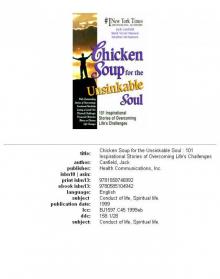 Chicken Soup Unsinkable Soul
Chicken Soup Unsinkable Soul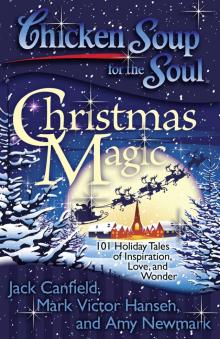 Chicken Soup for the Soul: Christmas Magic
Chicken Soup for the Soul: Christmas Magic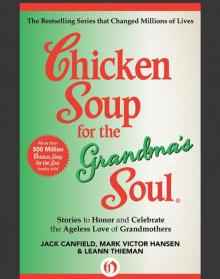 Chicken Soup for the Grandma's Soul
Chicken Soup for the Grandma's Soul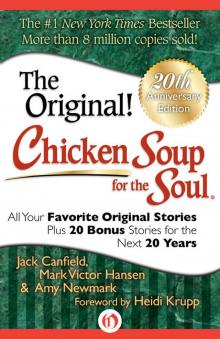 Chicken Soup for the Soul: All Your Favorite Original Stories
Chicken Soup for the Soul: All Your Favorite Original Stories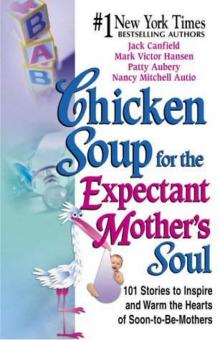 Chicken Soup for the Expectant Mother's Soul
Chicken Soup for the Expectant Mother's Soul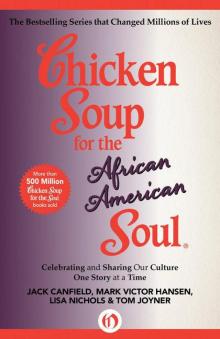 Chicken Soup for the African American Soul
Chicken Soup for the African American Soul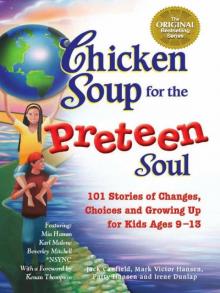 101 Stories of Changes, Choices and Growing Up for Kids Ages 9-13
101 Stories of Changes, Choices and Growing Up for Kids Ages 9-13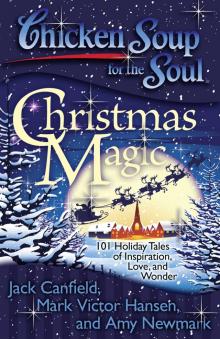 Christmas Magic
Christmas Magic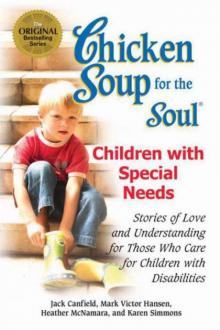 Chicken Soup for the Soul: Children with Special Needs
Chicken Soup for the Soul: Children with Special Needs Chicken Soup for the Soul: Country Music: The Inspirational Stories behind 101 of Your Favorite Country Songs
Chicken Soup for the Soul: Country Music: The Inspirational Stories behind 101 of Your Favorite Country Songs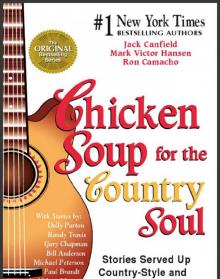 Chicken Soup for the Country Soul
Chicken Soup for the Country Soul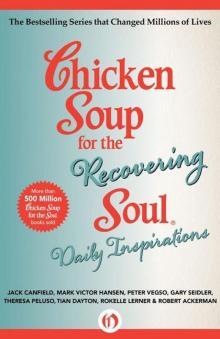 Chicken Soup for the Recovering Soul Daily Inspirations (Chicken Soup for the Soul)
Chicken Soup for the Recovering Soul Daily Inspirations (Chicken Soup for the Soul)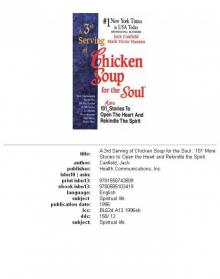 A 3rd Serving of Chicken Soup for the Soul
A 3rd Serving of Chicken Soup for the Soul The Book of Christmas Virtues
The Book of Christmas Virtues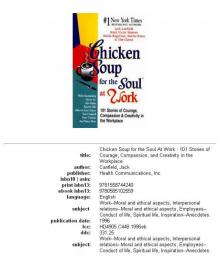 Chicken Soup for the Soul at Work
Chicken Soup for the Soul at Work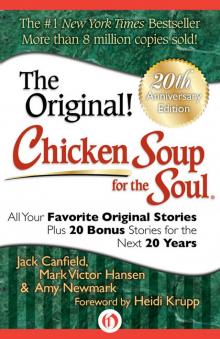 Chicken Soup for the Soul 20th Anniversary Edition
Chicken Soup for the Soul 20th Anniversary Edition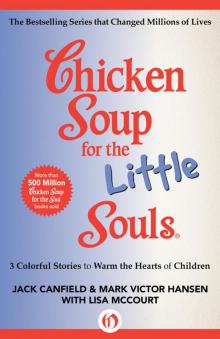 Chicken Soup for the Little Souls
Chicken Soup for the Little Souls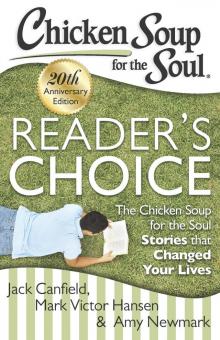 Chicken Soup for the Soul: Reader's Choice 20th Anniversary Edition
Chicken Soup for the Soul: Reader's Choice 20th Anniversary Edition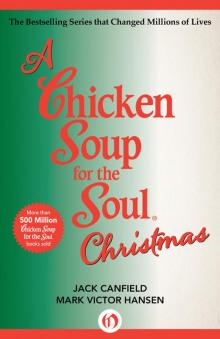 Chicken Soup for the Soul Christmas
Chicken Soup for the Soul Christmas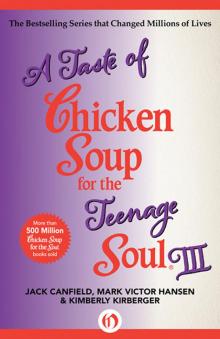 Taste of Chicken Soup for the Teenage Soul III
Taste of Chicken Soup for the Teenage Soul III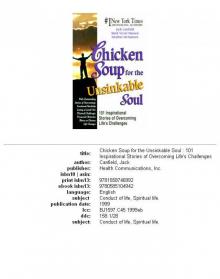 Chicken Soup for the Unsinkable Soul
Chicken Soup for the Unsinkable Soul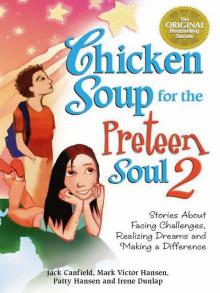 Chicken Soup for the Preteen Soul II
Chicken Soup for the Preteen Soul II